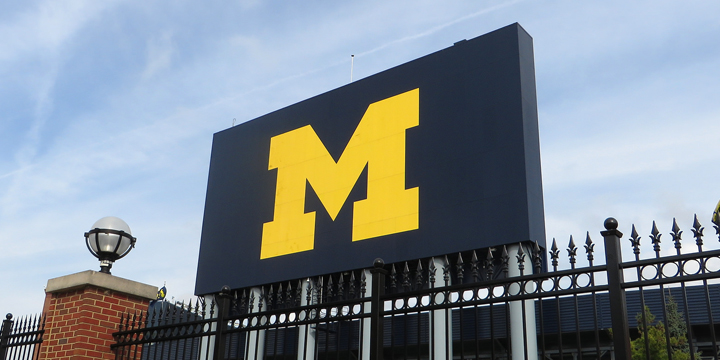
University of Michigan ‘Disappointed’ After Professor Refuses to Write Recommendation Letter for Student Studying Abroad in Israel
The University of Michigan (U-M) said it was disappointed after a professor refused to write a letter of recommendation for a student who sought to study abroad at Tel Aviv University, in an expression of support for the academic boycott of Israel.
In an email sent on September 5, Professor John Cheney-Lippold told the student, who had taken a course with him during the Spring 2018 semester, that he would have to rescind an earlier offer to write a letter of recommendation due to “politics.”
“I am very sorry, but I only scanned your first email a couple weeks ago and missed out on a key detail,” wrote Cheney-Lippold, who teaches in the Department of American Culture’s Digital Studies program.
“As you may know, many university departments have pledged an academic boycott against Israel in support of Palestinians living in Palestine,” he said in reference to the boycott, divestment, and sanctions (BDS) campaign against Israel.
Cheney-Lippold noted that the academic boycott forbids “writing letters of recommendation for students planning to study” in Israel — a stipulation included in the official BDS guidelines.
He apologized for not informing the student of his stance earlier, and said he would be happy to write them other letters.
The student, who chose not to disclose their identity, reported the “very disturbing and unsettling email” in a note sent the following day to U-M President Mark Schlissel.
“I firmly believe that any student’s abroad experience should not be impacted or dictated by any professor’s personal political beliefs,” they wrote. “I feel that his response is very disturbing, as he is allowing his personal beliefs (and apparently those of ‘many university departments’) to interfere with my dreams of studying abroad.”
“All I asked for was an academic recommendation regarding my work habits, diligence, and aptitude as a student,” they continued.

An email sent by University of Michigan Professor John Cheney-Lippold to a former student on September 5, 2018. Photo: Courtesy.
The student pointed out that Cheney-Lippold’s rejection did not appear to stem from any objection to their work ethic or other characteristics, but rather “his own political views.”
They called this stance “unconscionable and hypocritical, as presumably he would have no problem in issuing a letter of recommendation” to students who seek to study abroad in “totalitarian” countries and territories as part of a formal U-M program, namely “China, Cuba, Russia, Jordan and the Palestinian Territories.”
The student further suggested that Cheney-Lippold’s conduct appears to be in violation of a 2017 statement by U-M’s Board of Regents rejecting the BDS campaign, as well as Public Acts 526 and 527, which were signed into law in Michigan in 2016. The bipartisan bills, similar to others that have been passed in nearly two dozen states, bar state agencies from contracting with an individual who is engaged in “the boycott of a person based in or doing business with a strategic partner,” namely Israel.
The student’s father, an attorney, said he was informed that the university doesn’t have a current policy about such BDS compliant behavior “that applies to their teachers or their staff, and that that’s under review now.”
Students who request letters of recommendation “should be judged based on [their] resume and academic qualifications, period,” he told The Algemeiner on Monday. “Teachers shouldn’t have a right to inject their personal viewpoints about this.”
He expressed hope that anti-BDS policy will be “applied with all of their teachers and faculty so that no other student ever has to get a letter like this, which we found false on a million different fronts.”
“We are against BDS on many different levels,” he added. “It’s false, I think it’s antisemitic, and I think it doesn’t accurately portray what Israel is about and what Israel is doing.”
“They give people of all creeds and colors the opportunity to study and to express their views, and this is unlike any other situation in the Middle East, where you can’t express yourself in that fashion,” he continued. “So I am glad that Michigan has come up with an anti-BDS policy and that the university regents have also indicated that they’re against any kind of academic boycott of Israel, and we are waiting to hear from the university.”
Rick Fitzgerald, a spokesperson for the University of Michigan, told The Algemeiner on Monday that the school “has consistently opposed any boycott of Israeli institutions of higher education.”
“No academic department or any other unit at the University of Michigan has taken a position that departs from this long-held university position,” he confirmed.
“The academic goals of our students are of paramount importance. It is the university’s position to take all steps necessary to make sure our students are supported,” Fitzgerald continued. “It is disappointing that a faculty member would allow their personal political beliefs to limit the support they are willing to otherwise provide for our students.”
He said the school will engage its faculty colleagues “in deep discussions to clarify how the expression of our shared values plays out in support of all students.”
U-M made headlines in November after its student government passed a divestment resolution targeting Israel. A history professor who was barred from speaking at the divestment hearing told The Algemeiner at the time that “in my department alone there are six pro-BDS senior professors.”
Earlier in the year, despite objections from some Jewish students, the university’s Center for Middle Eastern and North African Studies sponsored a lecture by former academic and BDS activist Steven Salaita, who had previously accused “Zionists” of “transforming ‘antisemitism’ from something horrible into something honorable since 1948.”
Source: The Algemeiner